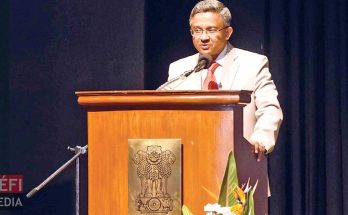Will the post-Pathankot ice thaw in Nepal next month? Even as the fate of foreign secretary-level talks remain uncertain in the wake of the long shadow cast by the Pathankot terror attacks, there is a strong possibility of a meeting between India’s External Affairs Minister Sushma Swaraj and Pakistan’s Prime Minister’s Foreign Affairs Adviser Sartaj Aziz on the sidelines of the upcoming SAARC Foreign Ministers’ meet in Nepal, scheduled for March 14-17.
The SAARC foreign ministers’ meeting will be held on March 17, which will be preceded by meetings of SAARC Programming Committee and Standing Committee on March 14-15 and March 16 respectively, Nepal’s Foreign Ministry Spokesperson Tara Prasad Pokharel announced a few days ago.
All SAARC member states Afghanistan, Bangladesh, Bhutan, India, the Maldives, Pakistan and Sri Lanka have confirmed their participation in the meeting, which is expected to be held in the resort town of Pokhara. Foreign ministers from all countries, except Pakistan, are expected to attend the meeting. Pakistan, which does not have a foreign minister at present, is expected to be represented by Mr Aziz.
Prompt means prompt
Given the current play of India-Pakistan relations, there is a dim possibility of any forward movement on bilateral ties, which had been strained by the Pathankot airbase assault, masterminded by Pakistan-based Jaish-e-Mohamed. India has shared actionable evidence with Pakistani authorities on the involvement of JeM in the Pathankot attack, with the Pakistani side responding positively, for a change, that they will look into it and complete the probe into the airbase terror strike. Unlike the 26/11 attacks, when Pakistan was in a denial mode, this time round, Prime Minister Nawaz Sharif assured prompt action to prosecute the attackers of the Pathankot airbase. Prompt means prompt – and one does not need Vikas Swarup, spokesperson of India’s external affairs ministry, to explain the literal meaning of prompt. But as anyone familiar with the twisted saga of India-Pakistan relations knows, prompt in this context could mean infinite deferral. Thus, more than a month after the terror attack, there is no sign of any visible action by Pakistan vis-à-vis the Pathankot attack, except detaining Masood Azhar, the chief of JeM.
From Mumbai to Pathankot: Infinite Deferral
In the meantime, a string of recent developments have muddied the waters, as it were, and put a huge question mark on Pakistan’s sincerity and capability to deliver on its anti-terror promise. Islamabad High Court’s recent decision to refuse voice samples of alleged perpetrators in the 26/11 Mumbai terror attacks only underlined the pronounced trend of a thousand revisions and prevarications that has marked Pakistan’s response to the mass slaughter in Mumbai more than seven years ago. In the context, a string of damning revelations by Pakistan-born LeT operative David Coleman about the role of Pakistan’s spy agency ISI in planning, funding and executing the Mumbai terror spree has revived painful memories in India, accentuating public trust deficit in India about Pakistan’s intentions.
The SAARC meeting in Kathmandu is still more than a month away, and a lot can happen in the interim to change the atmospherics in the unpredictable India-Pakistan relations. Otherwise, one has to just bank on the Kathmandu weather and cheery sunshine to brighten up perpetually cloudy ties between the two estranged neighbours.
Author Profile

- Manish Chand is Founder-CEO and Editor-in-Chief of India Writes Network (www.indiawrites.org) and India and World, a pioneering magazine focused on international affairs. He is CEO/Director of TGII Media Private Limited, an India-based media, publishing, research and consultancy company.
Latest entries
 India and the WorldMarch 3, 2024India-Denmark Connect: Red carpet for Indians to Red Sea cooperation
India and the WorldMarch 3, 2024India-Denmark Connect: Red carpet for Indians to Red Sea cooperation India and the WorldFebruary 17, 2024Munich Security Conference: Jaishankar, Blinken focus on Red Sea, Middle East
India and the WorldFebruary 17, 2024Munich Security Conference: Jaishankar, Blinken focus on Red Sea, Middle East India and the WorldFebruary 14, 2024Munich Security Conference report: Migration, war top security threats
India and the WorldFebruary 14, 2024Munich Security Conference report: Migration, war top security threats India and the WorldJanuary 23, 2024With “Ram to Rashtra” mantra, Modi consecrates Ram temple for national renewal
India and the WorldJanuary 23, 2024With “Ram to Rashtra” mantra, Modi consecrates Ram temple for national renewal










